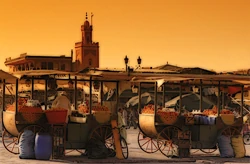
| |
| Azad | |
|---|---|
| Latitude | 20°29'S |
| Longitude | 32°16'E |
| Founded | 998 |
| Ruler | Sultan Maqbas Maqbasi |
| Population | 34,920 |
| Religions | Karaslaa |
| Languages | Raumdari |
Inhabitants of Azad | |
Azad is the capital city and one of only two settlements in the Sultanate of Zabah Mujir in the Kaspari Empire. The city lies in an oasis less than 2 miles across in the middle of a sea of shifting sand dunes in the Tunzaqi Desert. Travellers to Azad must navigate the shifting sands, as no roads to the city have yet been constructed, and the passage across the desert remains treacherous. Many travellers have become lost in the desert on the way to Azad.
The people of Azad are eventempered. Unlike the citizens of some other Kaspari cities, they are relatively patient even with the "unenlightened" (which, to them, includes all non-Karaslaa). The hospices of Azad are legendary for their cleanliness and hospitality. Because of their quality, many pilgrims journeying across the western Dulqa choose the overland route as opposed to the more expensive (but much safer) passage by ship. While such pilgrims know they should not flaunt their adherence to any faith that contradicts the beliefs of the city, they also know the people of Azad will not hunt them down like mad dogs for such beliefs.
Azad is Karaslaa moralism as it is meant to be. The city's residents are well fed and well tended. There are no beggars in the streets or marketplace, and even the poorest members of society have clean robes and satisfied (if not full) bellies. Entertainments include mystery plays of common legends (all bearing serious moral lessons beneath their humor and jibes) and the recitation of poetry. Work is regular throughout the year. If people are not needed to harvest or plant, they can renovate and rebuild houses in the city itself. If the people of Azad seem a bit smug, it is because they have something to be smug about.
The city is peaceful, though trouble often arises from those who bring it with them: thieves, barbarians, confidence artists, and misguided individuals. The chief job of the city guard is to keep such troublemakers from disrupting the lives of the people of Azad.
Those who come to the city intent on foul play or mischief are first cautioned, then arrested if warnings are ignored. Trials are quick. If the individual shows true penitence, they are also just. In Azad, enlightened but misguided criminals who venerate an unrecognized god are rarely put to death. Instead, they may be enslaved for a number of months, fulfilling their sentence by serving the church.